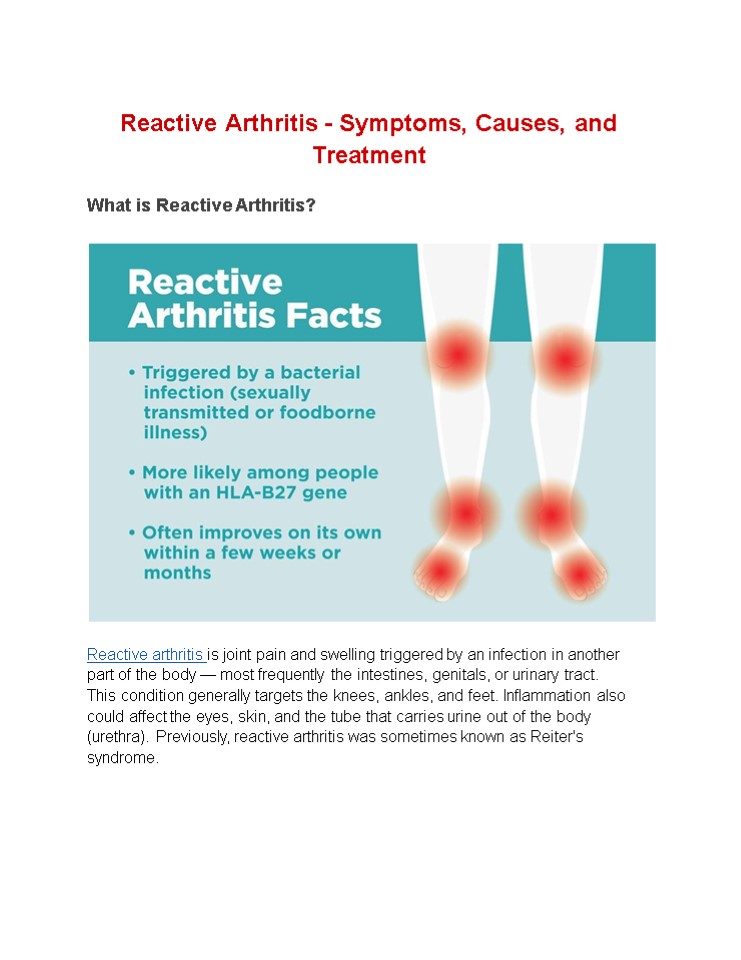Reactive Arthritis - Symptoms, Causes, and Treatment - PowerPoint PPT Presentation
Title:
Reactive Arthritis - Symptoms, Causes, and Treatment
Description:
If you're suffering from reactive arthritis, read on to learn about the best ways to treat it and get back to your normal life as soon as possible. Find out about the most common causes of reactive arthritis here, and know how to get relief from your pain and inflammation. – PowerPoint PPT presentation
Number of Views:15
Title: Reactive Arthritis - Symptoms, Causes, and Treatment
1
Reactive Arthritis - Symptoms, Causes, and
Treatment What is Reactive Arthritis?
Reactive arthritis is joint pain and swelling
triggered by an infection in another part of the
body most frequently the intestines, genitals,
or urinary tract. This condition generally
targets the knees, ankles, and feet. Inflammation
also could affect the eyes, skin, and the tube
that carries urine out of the body (urethra).
Previously, reactive arthritis was sometimes
known as Reiter's syndrome.
2
- Symptoms of Reactive Arthritis
- The signs and symptoms of reactive arthritis
generally begin one to four weeks after exposure
to a triggering infection. They may include - Pain and stiffness - The joint pain associated
with reactive arthritis most commonly happen in
the knees, ankles, and feet. Pain might also
occur in the heels, low back, or buttocks. - Eye inflammation - Many people who suffer from
reactive arthritis also develop eye inflammation
(conjunctivitis). - Urinary problems - Increased frequency and
discomfort during urination might occur, as can
inflammation of the prostate gland or cervix. - Inflammation of tendons and ligaments where they
attach to bone (enthesitis) - This happens most
frequently in the heels and the sole of the
feet. - Swollen toes or fingers - In some cases, toes or
fingers may become so swollen that they look
like sausages. - Low back pain - The pain tends to get worse at
night or in the morning.
3
- Causes of Reactive Arthritis
- Reactive arthritis develops in reaction to an
infection in your body, usually in your
intestines, genitals, or urinary tract. You may
not be aware of the triggering infection if it
causes mild symptoms or none at all. - Numerous bacteria could cause reactive arthritis.
Some are transmitted sexually, and others are
foodborne. The most common ones are - Campylobacter
- Chlamydia
- Clostridioides difficile
- Escherichia coli
- Salmonella
- Shigella
- Yersinia
- Reactive arthritis is not contagious. However,
the bacteria that cause it could be transmitted
sexually or in contaminated food. Only a few
people who are exposed to the bacteria develop
reactive arthritis.
4
- Risk factors of Reactive Arthritis
- Specific factors increase your risk of reactive
arthritis - Sudden (acute) pulmonary edema symptoms
- Age - Reactive arthritis happens most frequently
in adults between the ages of 20 and 40. - Sex - Women and men are just as likely to develop
reactive arthritis in response to foodborne
infections. Although, men are more likely than
women to develop reactive arthritis in response
to sexually transmitted bacteria. - Hereditary factors - A particular genetic marker
has been linked to reactive arthritis. But the
majority of people who have this marker never
develop the condition. - Continue to Read in Details Click Here
- If you or anyone you know is suffering from
reactive arthritis, our expert providers at
Specialty Care Clinics will take care of your
health and help you recover. - Call us on (469) 545-9983 to book an appointment
with our specialists.































